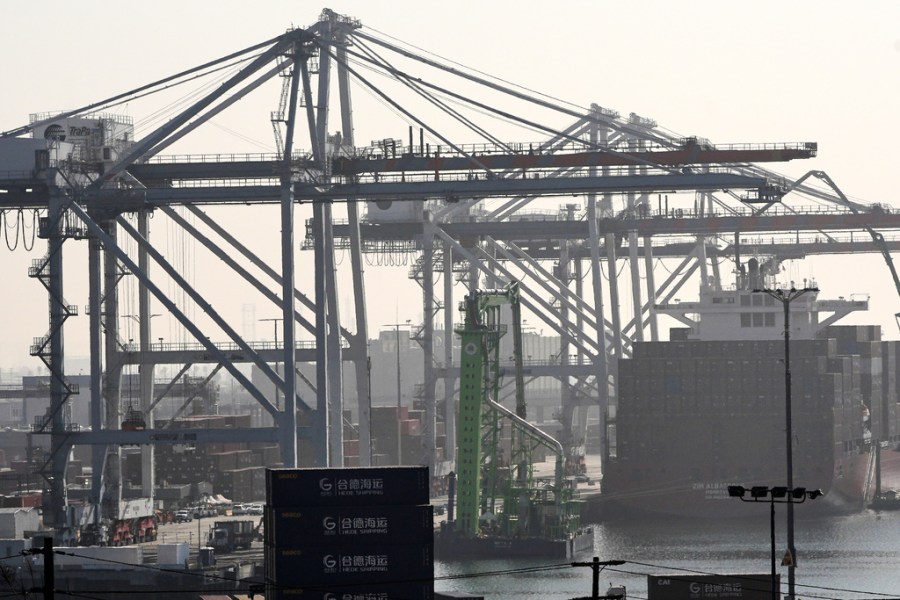World
US and China Raise Port Fees, Intensifying Trade Dispute

The United States and China have implemented additional port service fees and tariffs, escalating the ongoing trade dispute between the two countries. This latest development threatens to increase shipping costs, reduce trade volumes, and potentially lead to significant job losses on both sides. The measures, which took effect in September 2023, could have far-reaching implications for the global economy.
In a bid to protect domestic industries, the United States announced a new set of tariffs affecting approximately $300 billion worth of imports from China. This move follows China’s decision to impose its own tariffs and additional service fees on goods shipped from the US. Major ports, including the Port of Los Angeles and the Port of Shanghai, are now facing increased operational costs, which are likely to be passed on to consumers.
Both governments have framed these measures as essential for national security and economic stability. According to the World Trade Organization (WTO), trade tensions between the two largest economies in the world could lead to a decrease in global trade volumes and higher prices for consumers worldwide. The WTO has called for dialogue to resolve these disputes, emphasizing the need for collaborative solutions.
The additional fees are not just a matter of tariffs; they also encompass logistics and handling charges at major ports. For instance, shipping costs through the Port of Los Angeles have surged by as much as 20% since the implementation of these new fees. This has raised concerns among importers and exporters who rely heavily on maritime trade.
The economic repercussions extend beyond just the shipping industry. Analysts predict that the rising costs could trickle down to various sectors, affecting everything from retail to manufacturing. With many companies already facing supply chain disruptions, the added burden of increased fees could lead to further delays and increased prices for end consumers.
In light of these developments, both domestic and international businesses are bracing for a challenging economic environment. The potential for job losses is significant, particularly in industries heavily reliant on trade. According to estimates, thousands of jobs could be at risk if the trade dispute continues to escalate.
As the situation unfolds, stakeholders are urging both nations to engage in meaningful negotiations to de-escalate tensions. The importance of a stable trading relationship between the US and China cannot be overstated, as it plays a critical role in the global economy. While both countries assert their commitment to safeguarding their economic interests, the long-term implications of these tariffs and fees remain uncertain.
The international community is closely monitoring the developments, hoping for a resolution before the trade dispute results in a more pronounced economic downturn. The situation emphasizes the interconnected nature of global trade and the potential consequences of protectionist measures.
In summary, the recent imposition of port service fees and tariffs by both the United States and China marks a significant escalation in their trade dispute. With implications for shipping costs, trade volumes, and employment, the effects of these measures are likely to be felt well beyond their respective borders.
-

 Science2 weeks ago
Science2 weeks agoIROS 2025 to Showcase Cutting-Edge Robotics Innovations in China
-

 Politics2 weeks ago
Politics2 weeks agoJudge Considers Dismissal of Chelsea Housing Case Citing AI Flaws
-

 World2 weeks ago
World2 weeks agoBravo Company Veterans Honored with Bronze Medals After 56 Years
-

 Lifestyle2 weeks ago
Lifestyle2 weeks agoStone Island’s Logo Worn by Extremists Sparks Brand Dilemma
-

 Health2 weeks ago
Health2 weeks agoStartup Liberate Bio Secures $31 Million for Next-Gen Therapies
-

 Top Stories2 weeks ago
Top Stories2 weeks agoIndonesia Suspends 27,000 Bank Accounts in Online Gambling Crackdown
-

 Sports2 weeks ago
Sports2 weeks agoMel Kiper Jr. Reveals Top 25 Prospects for 2026 NFL Draft
-

 Health2 weeks ago
Health2 weeks agoTop Hyaluronic Acid Serums for Radiant Skin in 2025
-

 World2 weeks ago
World2 weeks agoHoneywell Predicts Record Demand for Business Jets Over Next Decade
-

 Politics2 weeks ago
Politics2 weeks agoNew Jersey Voters Urged to Register Ahead of November Election
-

 Lifestyle2 weeks ago
Lifestyle2 weeks agoMary Morgan Jackson Crowned Little Miss National Peanut Festival 2025
-

 Sports2 weeks ago
Sports2 weeks agoYamamoto’s Mastery Leads Dodgers to 5-1 Victory in NLCS Game 2









